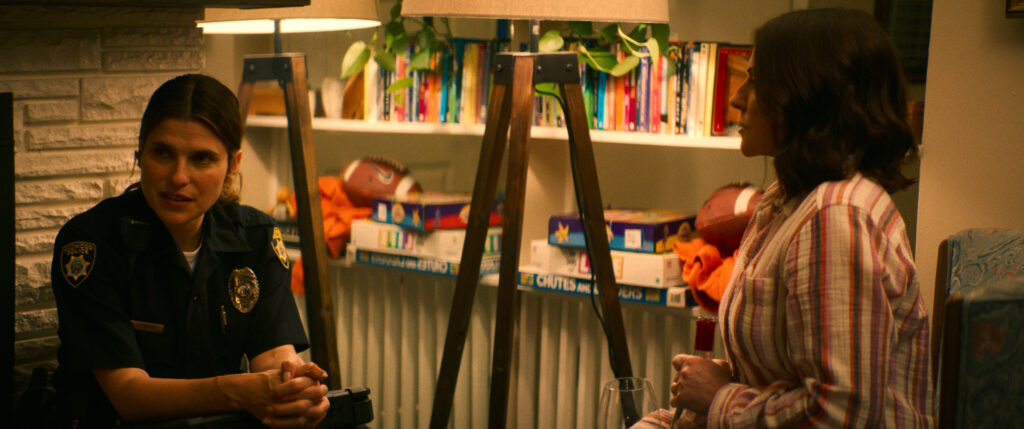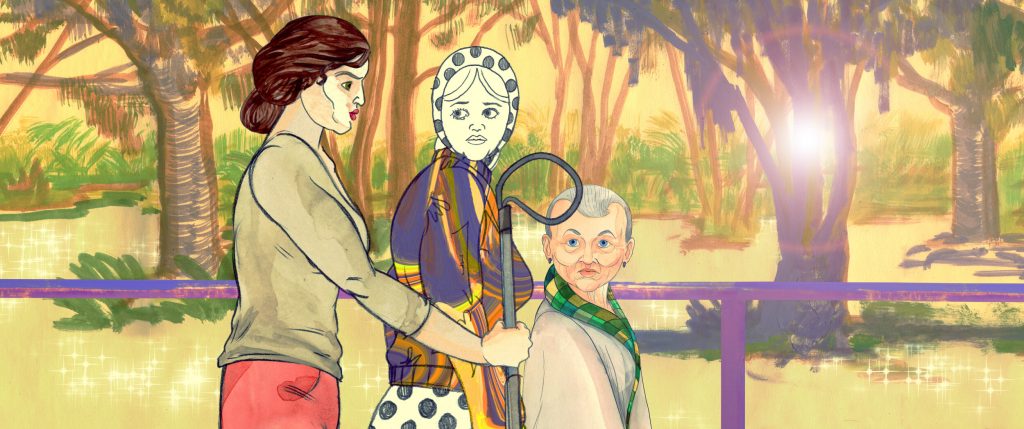September 21, 2022
by Carla Hay

Directed by James Ponsoldt
Culture Representation: Taking place in an unnamed city in Utah, the dramatic film “Summering” features a white and African American cast of characters representing the working-class and middle-class.
Culture Clash: In the summer before they start middle school, four 11-year-old girls find a dead man’s body in the woods, and the four friends decide to keep this discovery a secret among themselves.
Culture Audience: “Summering” will appeal mainly to people who are interested in stories about the lives of American tween girls, but “Summering” has very boring and often-ludicrous portrayals of how real tween girls act.

“Summering” is a monotonous pseudo-mystery about four 11-year-old girls who find a dead man’s body, and talk and act in ways that are very unrealistic for pre-teen girls. This pointless waste of time gets more irritating as it goes along. Avoid at all costs.
Directed by James Ponsoldt (who co-wrote the “Summering” screenplay with Benjamin Percy), “Summering” has a majority-female cast, but these female characters (especially the underage girls) are given fake-sounding dialogue that sounds like male filmmakers trying to pander to men’s ideas of how “progressive” women and girls should be. Almost everything in this movie looks phony and overly staged. “Summering,” which had its world premiere at the 2022 Sundance Film Festival, is undoubtedly one of the worst, most self-indulgent movies that screened at the festival this year.
“Summering” is very off-putting because you can tell that the filmmakers thought that they were making a great American movie about tween girls. It’s this pretentiousness that obviously clouded their judgment in not seeing how dull and clumsy everything turned out in “Summering.” One of the biggest problems is that the movie dangles a potentially good story in front of the audience, and then ruins the movie with a nonsensical plot that rambles, becomes unfocused, and ultimately doesn’t really go anywhere or have anything interesting to say.
What’s worse is that Ponsoldt claims he knows how to write about girls, just because he has a daughter. This movie is proof of what might have been a well-intentioned film to celebrate the female gender actually resulting in a tedious, mansplaining fantasy of how tween girls are supposed to act when experiencing something traumatic and making big decisions. In a director’s statement given to the media about why Ponsoldt made “Summering,” he had this to say, in part:
“‘Summering’ was born from a desire to make a film for my children, and especially for my daughter. It grew into a film about fears and anxiety—and ultimately, hope—in the age of COVID … While I’ve always loved films about childhood, our first encounters with death, and how young people use imagination to process trauma in a way that’s different than the logic of adulthood, I’m not sure I could’ve made ‘Summering’ until I became a parent. As the parent of three young children, I find myself constantly in this delicate gray space of both needing to protect my children and wanting them to live fearlessly.”
The statement continues, “As my daughter began seeking out more complex narratives, ones that mirrored her own hopes and fears, I became acutely aware of the privilege I enjoyed when I was her age: I could easily see myself in stories, because the protagonists were boys and young men. My sister didn’t always enjoy this same privilege. Neither did my wife. Or my mother.”
Ponsoldt’s statement adds, “There are notable exceptions, of course, but in many instances the ‘classic’ coming of age stories about friendship and first brushes with mortality involve boys. In most of the movies of my sister’s childhood, or my mother’s, the female characters were love interests, or the main character’s sister. And female friendship was often defined by trauma—a victimization, or a rupturing of a friendship (when boys or men enter the story). I wanted to make a film in which my daughter could see herself. And her friends. I hoped to dignify the emotional inner lives of young female characters, to explore their imaginations and fears and hopes while they’re on the cusp of adolescence.”
If Ponsoldt didn’t want to make a movie about female friendship defined by “trauma … (when boys or men enter the story),” then why did he make “Summering” a movie about how four 11-year-old girls react to finding a dead man’s body in the woods? For almost the entire movie, the girls talk about what they’re going to do (or not do) about this gruesome discovery. Finding a dead body would be traumatic for people of any age. The girls who find this corpse act like it’s not a big-enough deal to tell any adults or anyone else.
At first glance, “Summering” looks like it’s trying to be a ripoff of director Rob Reiner’s classic 1986 film “Stand by Me” (adapted from Stephen King’s 1982 novella “The Body”), which is about four adolescent boys who find a dead boy’s body near a swamp. In “Stand by Me,” the boys intentionally looked for the body of this missing boy and know his name before the corpse is found. In “Summering,” the girls accidentally find the dead body of a man who is a complete stranger to them.
Before anyone thinks that “Summering” is trying to copy “Stand by Me,” think again. “Summering” is too lazy to even be an imitation of a good film. A movie that tries to be a ripoff of a classic movie should at least be inspired by the best elements of that classic movie. “Summering” doesn’t even make any effort to be any good at all. “Summering,” which is cringeworthy from the very first scene, gets worse as the movie lumbers along at a sluggish pace.
“Summering,” which was filmed on location in Utah and takes place in an unnamed city, opens with four best friends (who are all 11 years old) walking through the woods together. It’s the last week of summer before they all start middle school. The four pals are outspoken feminist Daisy (played by Lia Barnett), rebellious brat Dina (played by Sanai Victoria), eccentric introvert Mari (played by Eden Grace Redfield) and mystic enthusiast Lola (played by Sanai Victoria).
Daisy gives intermittent voiceover narration throughout the movie. She says in one of these voiceovers: “Sometimes, I worry I need my friends more than they need me. But it’s hard to be sad when the sun is so huge and so right.”
Daisy continues, “Sometimes, my house has so many shadows in it, it feels so heavy, like it could sink into the earth. But I never felt that way with my friends. Summer has no walls. We can go everywhere, see everything.”
If that isn’t enough to roll your eyes at this pretentious, adult-sounding monologue that’s supposed to be coming from an 11-year-old girl, there will be plenty of other badly written and horribly staged moments in “Summering” that will make you roll your eyes at the thought that anyone thought this tripe was good filmmaking. During this walk through the woods, Dina says, “I hate skirts.” Daisy replies, “They’re so patriarchal.” This feminist speak might sound more believable coming from a teenager, but not an 11-year-old.
The girls are walking through the woods to bring incense, myrrh and gum to a Terabithia shrine that they made. The shrine was probably Lola’s idea, because much later in the movie, the four girls hold a seance at Lola’s urging. It isn’t long before the four friends find the dead body in the woods. The deceased man, who appears to be in his 30s, is fully clothed in a blue business suit. The girls speculate that he could have fallen from a bridge that’s 100 feet above them. This bridge has the nickname The Suicide Bridge.
Mari’s first reaction to seeing the dead body is to call 911. (All of the girls have cell phones with them.) However, Dina convinces her not to call for help or to tell any adults: “I mean, what’s the rush?” Dina asks. “He’s not in any rush,” she says of the dead man. Dina also says if they tell anyone else about the dead body, the girls’ mothers and the police will just ask “a million questions” that Dina doesn’t want to to answer.
Lola comments on this dead man: “This is on us. This is our [dead] body.” The girls all agree that they should wait one day before telling any adults about this body. But that one day turns into two days, and then several days where they don’t tell anyone. The girls keep the body a secret because they want to try to find out the mystery of this stranger all by themselves.
What kind of garbage is “Summering” selling? Most 11-year-old kids would not be able to keep something like finding a dead body a secret just because they think it would be cool to play dectective and find out more about a dead man whom they found in the woods. This atrocious movie depicts these girls in such a phony manner, none of them has nightmares about the body. These girls don’t show any real guilt about hiding information about someone who’s probably been reported missing.
Instead, the girls decide to move the body and use latex gloves, so their fingerprints won’t get on the corpse. While they hide this secret from everyone but themselves, the four pals do somersaults on lawns and frolic around the neighborhood, as if they don’t have a care in the world. It’s all just so heinous.
Another thing that’s very fake about “Summering” is that it takes too long in the movie for the girls to do an Internet search about this mystery man they found in the woods. An Internet search would be one of the first things that 11-year-old kids with access to the Internet would do. It just makes these girls look less-than-smart, which is not exactly the “female empowerment” message that director Ponsoldt claims to have for this terrible movie.
And where are the parents during all of this nonsense? In its bungled effort to be a strong, female-oriented film, “Summering” mainly shows the girls’ mothers interacting with them in mostly shallow ways. Daisy’s divorced father (played by Dale McKeel) is shown briefly as being a deadbeat dad. All of these parents are underdeveloped characters and are in the movie’s many filler scenes.
Daisy’s no-nonsense mother Laura (played by Lake Bell) is a police officer. Yes, you’ve read that correctly. “Summering” wants you to believe that a cop’s 11-year-old daughter is moving a dead man’s corpse around in the woods with three of her other 11-year-old friends, because the girls think it’s an adventurous thing to do before they start middle school.
Mari’s goofy mother Stacie (played by Megan Mullally) has a close relationship with Mari, the only one of the four pals who shows a little discomfort about their big secret. But it’s not enough discomfort to tell any adults about this huge problem. Even though Stacie thinks she knows Mari very well, Stacie has no clue that Mari is essentially involved in serious crimes (tampering with evidence; unauthorized removal of a corpse) related to a dead body.
Dina’s high-strung mother Joy (played by Ashley Madekwe) has her hands full with Dina’s mean-spirited teenager sister Carol (played by Willow Corner-Bettweiser) and Dina. Carol and Dina frequently feud with each other. Lola’s laid-back mother Karna (played by Sarah Cooper) is an artist who is usually seen painting something on an art canvas. What these mothers do have no big impact on the movie’s main plot of the girls hiding the secret of the dead body.
In addition to the off-balance tone of “Summering,” the movie badly stumbles in its mismatched casting of talented and experienced cast members (the actresses who play the mothers) with less-experienced cast members (the actresses who play the four 11-year-old friends), whose talent doesn’t reach the same level. On screen, the disparity in these two levels of talent just makes everything look worse.
“Summering” is not presented as a satire or as an absurdist escapist film. This dreadful movie really wants to be viewed as a serious drama that’s supposed to accurately reflect the interior lives of 11-year-old girls. When it comes to this attempt at authenticity and being an influential film about girlhood, “Summering” is a complete and utter failure.
Bleecker Street released “Summering” in select U.S. cinemas on August 12, 2022.


